- Home
- James A. Michener
Recessional: A Novel Page 10
Recessional: A Novel Read online
Page 10
‘At the end of that famous inning we have ten runs, unbelievable, and the victory. And our luck holds, because next day we go into the bottom of the ninth trailing two to zero, but like before we start pecking away and win the game three to two, and wind up the series four to one, favor of us.’
Recalling those miraculous days when he was twenty-two and champion of the world, he stopped being a garrulous old raconteur and finished with an effective parable penned by the writer: ‘And so we see that we are the toys of fate. Chance determines so much of our lives, as my case proves. I keep with me photographs of my two hits in the wild inning. They show Hornsby missing my grounder by less than an inch and my pop fly, same margin. An inch and a half in his favor, I’m a bum. An inch and a half my way, I’m in the Hall of Fame. Chance does direct all.’
The light faded from his eyes. His voice returned to its characteristic rumble, and once more he was eighty-eight years old, enjoying a Florida retirement complex paid for by admirers who felt that they too had shared in the glory of that distant Columbus Day in 1929.
Although Zorn was mesmerized by Bixby’s talk, he was not entirely happy with it, for the old hero had talked so long that he denied Zorn a chance to deliver his sales pitch about the Palms. But the lunch was not a loss: the Sarasota club members told so many of their fellow Rotarians in south Florida that the great Buzz Bixby was residing at a rather neat place called the Palms that they began telephoning to see if they might hold one of their meetings where Buzz could address them. So many asked that Zorn had to say: ‘We’d be honored, but we can’t keep doing this for free,’ and the various clubs gladly paid for their lunches. Zorn also organized a program so that he was assured ten minutes at the end to speak about the Palms. As the weeks passed he found that he was listening to Buzz so often that he had memorized the speech and would catch himself reciting as he went about his duties: ‘Some who ought to know are of the opinion that it was the greatest inning in the history of baseball,’ so he made an adjustment in the schedule. He spoke first, then had Krenek hurry in: ‘Dr. Zorn! Important call from Chicago,’ and out he scurried. Although he and Krenek did notice that patronage from the Sarasota area had increased, in his March report he could not yet tell Chicago: ‘The Palms is now in the black.’ But he would keep working.
One of Andy Zorn’s most reassuring experiences at the Palms was his discovery that John Taggart had told him the truth about the man he would be working with. Ken Krenek had a remarkable ability to work for those above him. He studied their habits, their preferences, their weaknesses and their vaulting ambitions. He then asked himself: What can I do to help this man achieve the best for both of us? He seemed to have neither vanity nor envy.
At fifty-four he was the epitome of indispensable service, as exemplified in that marvelous word factotum (from the Latin facere, do, and totum, everything). A smiling pragmatist, he had the job of keeping everyone happy, which meant that he was on call a good twenty hours each day. A leaky faucet was brought to his attention at midnight, and a bus arriving fifteen minutes late for a scheduled nine-in-the-morning start was sure to result in telephone calls to Ken, as he was generally called. He arranged for guest quarters when relatives visited residents, found dentists and ophthalmologists when needed, and arranged tours to museums and parks and places of unusual interest in the Tampa–St. Petersburg area, work for which he was applauded by his appreciative guests.
But he was also in charge of two functions that brought the most protests from the residents: he allocated parking slots, a thankless task, and he was in charge of the food program, especially the operation of the dining room. Since only one meal a day was served to the majority of the people, the problem of feeding could have been considered secondary—quite the opposite, it was a constant challenge and a constant woe.
Parking at any retirement center throughout the United States is usually difficult for several reasons. First, the kinds of people who enroll in the centers are from families of more than modest means, and they are apt to have two cars, whereas the centers have been built on the supposition that the occupants of each apartment will have only one car. Thus there is a fundamental problem that can never be easily solved; there simply is never enough room for all the automobiles, and attempts to wedge in a dozen unexpected new arrivals becomes an impossible task. Second, strong-minded people with two fine cars want them parked side by side and raise all sorts of protest when one car is assigned a choice spot and the other a corner of a more distant parking area. Third, in an upscale place like the Palms, the car or cars represent not only the most valuable but the most important item that the couple brings with them because cars are a vital necessity in day-today living. On several occasions couples had moved out, demanding refunds, primarily because the problems of parking could not be solved.
Krenek told Zorn at the conclusion of one unresolved battle: ‘We should mail brochures only to couples with one car, and it has to be a European mini-mini. No Cadillacs, no Lincolns and, for heaven’s sake, no elongated station wagons.’ Then he ridiculed his own suggestion: ‘I know we exist on the occupancy of people with two big Mercedes or Jaguars, but have you given serious thought to the possibility that all places like ours might one day have to erect three-level skeleton garages? Don’t laugh. I can’t see any other solution.’ When Zorn pointed out that they had all that open land in the savanna, Krenek replied: ‘But our residents are older and not very surefooted, and they’re willing to walk only so far to get to their cars. Andy, this is one hell of a mess and I see no easy solutions—fact is, I don’t see any difficult solutions, either.’
In supervising the dining room Krenek enjoyed more success. A health fanatic himself, with a partiality for fish, poultry, vegetables, salads and whole grains, he, with the help of his cooperative staff in the kitchen, offered a menu that was both diverse and healthful. In a printed menu that changed radically from day to day, he offered for the evening meal a soup, a meat dish, a fish course, three vegetables and, to the delight of almost everyone, a huge salad bar filled with lettuce, pickles, sliced tomatoes, fruits, croutons, applesauce, pineapple cubes and other appetizing foods. Some relatively abstemious residents had only the soup, the salad bar and dessert with a large glass of one of the many beverages served every evening. Some of the men were especially fond of the mild lemonade.
One would suppose that with a menu so varied—a different meat course every night through an eleven-day routine—that there could be few complaints, but Krenek was bombarded by two recurring protests that could at times grow rather heated. The first concerned dining hours. In retirement areas throughout the nation, it had been decided, as at the Palms, that the ideal hour for the evening meal was five-thirty in the late afternoon, and for a variety of reasons. The diners were older and did not want protracted dinners. Many of them wanted to watch the MacNeil/Lehrer Newshour at seven and would leave the dining room in time for it. The high school boys and girls who waited tables wanted to leave early for either study, the movies, favorite television shows or socializing with their friends. And the kitchen staff, especially the male cooks, also wanted to finish work early.
It seemed that once they had time to adjust to it everyone wanted the early hour except the more vocal residents. Señora Jiménez growled in her delightful self-deprecating way: ‘In Colombia we often finished lunch at five-thirty! This is uncivilized.’ People who had traveled to the Continent reported that in the good restaurants their evening meals were often served at nine or ten, or even, at places like Horchers in Madrid, at eleven. Most men did not seem to mind about the early hour, but their wives complained so constantly that Dr. Zorn had to carry their protests to Krenek: ‘Ken, can’t we do something about the dining hour?’
‘Andy, I give you my word, five-thirty is the most workable compromise—’
‘But some of the women—’
‘Andy, have you ever watched the lineup for dinner? Let’s go down this afternoon and see what’s happening.’ And
Zorn thought he meant he should be there at five-thirty, but Krenek corrected him: ‘I mean at a quarter to five, forty-five minutes early.’ When they got there at that hour they watched unobtrusively and Andy saw that some of the older couples were already lining up for their evening meal, waiting in chairs nearby so as to be first in line. At five some were actually in the dining room, staking out desired tables near the salad bar, and at a quarter past five the early birds were threading their way along the salad bar and picking off large helpings of favorite dishes, such as spiced apple squares and Spanish chickpeas marinated in a mild garlic sauce. By five-thirty when the doors officially opened, some of the popular salad dishes were already gone.
Back in Andy’s office. Krenek awakened him to the realities of food service at the Palms or any other retirement center: ‘The most important moment in the day for these older people is their evening meal. Sex is a thing of the past. They don’t go out to the movies very often. The men don’t go to ball games. Dinner is the climax of the day. I’m sure that if we served our evening meal at four-thirty, the eager beavers would be in line at a quarter to four, and the gate-crashers would have emptied the best salad dishes by four.’
‘I can’t believe that.’
‘This afternoon you told me you couldn’t believe that our people were starting their evening sit-downs at five o’clock. You saw them.’
‘Isn’t there anything we can do to stop the complaints?’
‘Andy, you didn’t grow up in the country. One thing you learn out there, early and painfully, is never agitate a hornet’s nest. You can walk by and not touch it, no strain, no pain. But if you poke a stick at it, all hell breaks loose. If you open this up for public discussion, you’ll age ten years before your time.’
‘Are we powerless?’
‘Yes. A compromise has been agreed on. It works. Not perfectly, but it works. So, please, no jabs at the hornet’s nest,’ and Zorn promised to desist from any further discussion on the matter.
It was by accident that he discovered another aspect of Krenek’s second perpetual headache. One day as he passed his assistant’s office door he heard loud voices. A woman was demanding: ‘Why can’t it be fixed?’ and Krenek was attempting to calm her while a man was saying angrily: ‘If you’d bought a good one in the first place, you’d have saved money.’ They were so vociferous that he waited for them to leave before popping into Krenek’s office and asking: ‘Ken? What’s the problem?’ Ken answered sheepishly: ‘It was my fault to begin with, and everything I’ve done to correct it only makes it worse and makes me look more foolish. You heard them.’
‘Cue me in.’
‘I’m a health nut, as you know. Most of my proposals have been warmly accepted. People appreciate simpler food, well prepared, lots of greens and low cholesterol. Well, I decided that for dessert we should knock off the ice cream overloaded with butterfat. Instead, we’d serve yogurt, healthiest sweet dessert in the world. We tried a small sample purchased from a public dairy, and the residents went crazy over it, said it was the best they’d ever had. But so many wanted it that I thought we couldn’t afford to go on buying the prepared product. So I had the bright idea of buying our own yogurt machine and the raw products that go into this excellent dessert.’
‘What happened?’
‘It worked perfectly, a smash success, and now everyone wants yogurt at the end of the meal.’
‘Why the fracas just now?’
‘Horrible miscalculation. The machine we had was meant to service ten, fifteen people. We had to serve more than a hundred and fifty. So it broke down. We had it fixed. It broke down again. We bought a new machine. It breaks down.’
‘What do you mean, “It breaks down”? Do the parts break?’
‘No, the system. Some nights it makes delicious, creamy yogurt. The next night it turns out sweetened ice chips. The following night it doesn’t freeze, just sweet milk at room temperature. And the next night it doesn’t turn on at all.’
That night Zorn walked through the dining room stopping at various tables to ask about the food, and the majority of the diners said: ‘First-rate. But there was no yogurt tonight.’ The complaint was so universal that the doctor returned to Krenek’s office and announced: ‘Ken, I’m taking over the yogurt machine. This thing can be licked,’ and he took down the phone number of the distributor.
The expert Allied Yogurt sent out was a Mr. Richardson, sixty years old and a veteran of the dairy business: ‘I’ve been making ice cream for most of my life. Yogurt is nothing but a modern variation, and you have the best machine in the business. A twist here, a twist there, and you get perfect yogurt, every time.’
He was far too optimistic. His adjustments mended the machine for two nights and the diners applauded, but on the third night it produced shaved ice with a smear of flavoring, and on the fifth night it stopped altogether.
When Mr. Richardson returned to fix the machine by replacing certain parts, it worked superbly—for half of the diners, those who beat the opening gong. The other half, who had respected the posted dining hours, got no yogurt, not even shaved ice, and the complaints grew.
Zorn would not admit defeat. He tried another machine with deplorable results, then tried a dairy that sold him a low-fat, non-cholesterol ice cream, which the diners refused to eat. His next proposal to the committees of protest was ingenious: ‘I’ve found a dairy that will provide us, within our budget, a real ice cream for those who can handle the butterfat, and an excellent real yogurt, not frozen.’ This worked for a while, a three-tier system: early birds got the good frozen yogurt; latecomers who were not dieting, the real ice cream; and those who were, real yogurt.
Still Zorn was not satisfied. One day, when a delivery man from the dairy said: ‘We make a wonderful sherbet. Costs less than ice cream. Real fruit juices. Low sugar. No butterfat at all,’ Zorn saw this as a solution to his problems and added the sherbet to his nightly menu. Of course, the machine making the frozen yogurt continued to break down two or three nights a week, but the ice cream and sherbet were always available, and now when he walked through the dining room to chat with the residents, far more than half said: ‘Very good meal. And the sherbet at the end was quite acceptable. We would have preferred frozen yogurt, but the girl said the machine was on the blink again.’
When a kind of truce had been achieved so that the residents no longer accused Ken Krenek of gross ineptitude, Zorn told his assistant: ‘Fair deal, Ken. You handle the squawks about parking, I’ll protect you on the yogurt front.’
To ensure that his eighty-seven retirement and health centers remained up-to-date, John Taggart employed a team of four traveling agents, experts in general medical care, and expected them to keep him and his organization apprised of new developments in the field. They were especially commissioned to inform Taggart of any new men or women who might be employed to strengthen any one of the Taggart centers that could profit from the infusion of new blood and fresh ideas.
The traveler responsible for much of the eastern seaboard, one Wilmerding, while tracking down an unlikely rumor in Georgia, came upon a phenomenon that he reported immediately to Chicago:
On several recent trips through the Carolinas and Georgia I’ve heard reports about a physical therapist and his wife who are performing miracles in the rehabilitation field. He seems to be able to get paraplegics, stroke victims and people with damaged limbs back to full or gratifying recontrol of their muscular systems. And he is also exceptional in his ability to affect his patients psychologically. He’s a long, lanky Georgia cracker who lives in a small town with his wife, a short dumpy woman, who is already a registered nurse. When seen standing close together they look like the figure 10.
His name is 100% bourbon, Bedford Yancey, hers is Ella, and he reminds me of a man my father told me about who played a major role in baseball back in the 1920s and ’30s. That wizard at healing cranky joints, stiff throwing arms and faulty knees was called Bonesetter Reese, and all the big-league teams
sent their damaged ball players out to this little town in Ohio for the Bonesetter to work on them. He effected miraculous cures, extended the working lives of pitchers and was especially skilled when a bone and its attached muscle were both involved.
Bedford Yancey could be a lineal descendant of Bonesetter Reese, and regional athletic teams are already using his services. But he is equally proficient with ordinary hospital cases, his rough-and-ready country style of treating his patients being highly acceptable to the practical-minded Georgians.
I’ve suggested before, Mr. Taggart, that our establishment in Tampa, the Palms, could profit from installing and featuring a first-class rehabilitation room, a kind of super-sized gymnasium with state-of-the-art physical therapy machines. They do not come cheap, and I’m enclosing estimates from three companies for a complete system. I recommend strongly that you send either Ken Krenek or our new man, Andy Zorn, up to Vidalia, Georgia—that’s halfway between Macon and Augusta—to investigate Yancey and his wife and to hire them now, if we can get them at a reasonable salary, and encourage them to make the Palms a rehabilitation center for the west coast of Florida at a cost we can monitor.
When this communication reached Taggart’s desk, he immediately telephoned Wilmerding and talked with him for twenty productive minutes, after which he endorsed in his own handwriting the man’s report: ‘Zorn to proceed to Georgia A.S.A.P. and if the two Yanceys are as good as herein reported, hire immediately. If they join us, Foxworth and Krenek authorized to set up rehabilitation-area ground-floor Health, state-of-the-art but lowest bidder. John Taggart.’
When Andy received these instructions he went immediately to his sedan and scooted up the good Florida highways to the Georgia border, from where he had a clean run into Vidalia. After asking a few questions he learned that the well-known muscle expert Bedford Yancey lived not in Vidalia itself but in a little rural town to the north on Route 297.

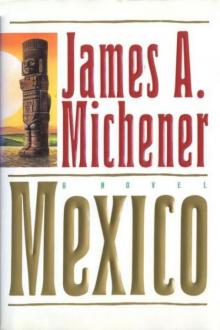 Mexico
Mexico The World Is My Home: A Memoir
The World Is My Home: A Memoir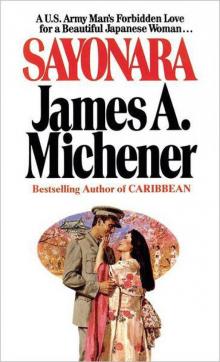 Sayonara
Sayonara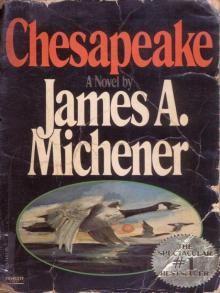 Chesapeake
Chesapeake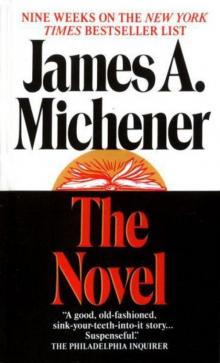 The Novel
The Novel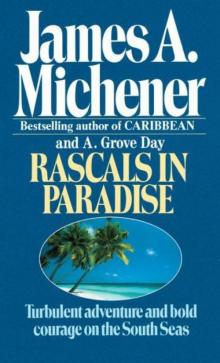 Rascals in Paradise
Rascals in Paradise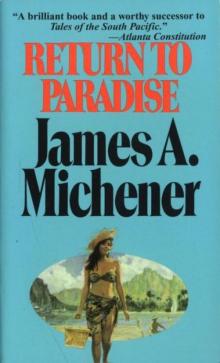 Return to Paradise
Return to Paradise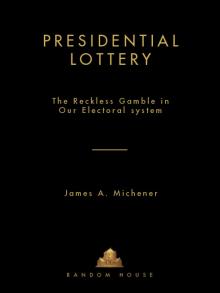 Presidential Lottery: The Reckless Gamble in Our Electoral System
Presidential Lottery: The Reckless Gamble in Our Electoral System The Source
The Source Poland
Poland Space
Space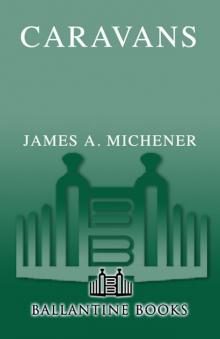 Caravans
Caravans Creatures of the Kingdom: Stories of Animals and Nature
Creatures of the Kingdom: Stories of Animals and Nature Iberia
Iberia Hawaii
Hawaii The Watermen: Selections From Chesapeake
The Watermen: Selections From Chesapeake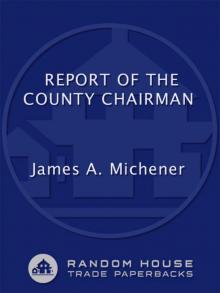 Report of the County Chairman
Report of the County Chairman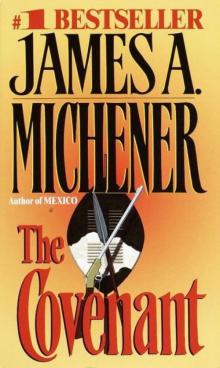 The Covenant
The Covenant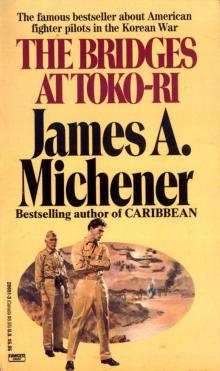 The Bridges at Toko-ri
The Bridges at Toko-ri Matecumbe
Matecumbe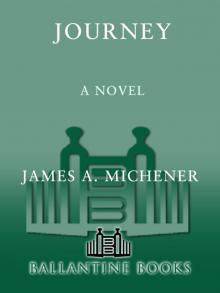 Journey: A Novel
Journey: A Novel Centennial
Centennial Sports in America
Sports in America Texas
Texas Miracle in Seville
Miracle in Seville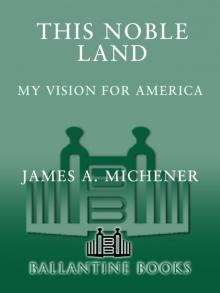 This Noble Land: My Vision for America
This Noble Land: My Vision for America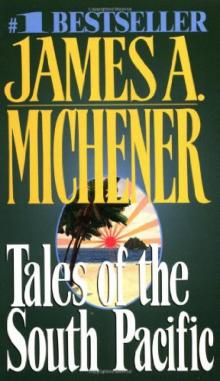 Tales of the South Pacific
Tales of the South Pacific Bridges at Toko-Ri
Bridges at Toko-Ri Space: A Novel
Space: A Novel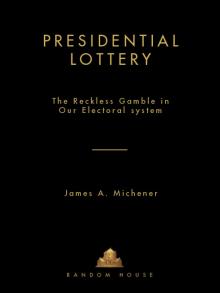 Presidential Lottery
Presidential Lottery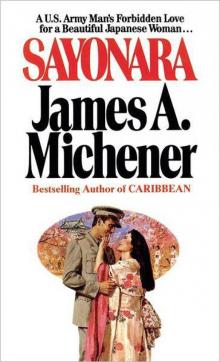 Sayonara: A Novel
Sayonara: A Novel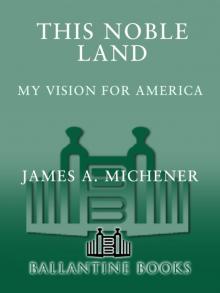 This Noble Land
This Noble Land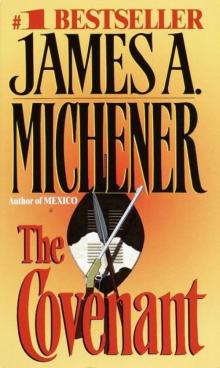 The Covenant: A Novel
The Covenant: A Novel Miracle in Seville: A Novel
Miracle in Seville: A Novel The Bridge at Andau
The Bridge at Andau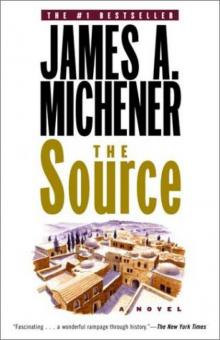 Source
Source The Source: A Novel
The Source: A Novel Journey
Journey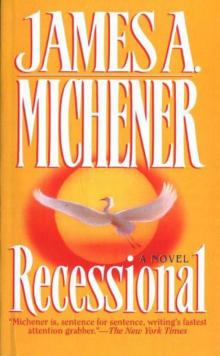 Recessional: A Novel
Recessional: A Novel Legacy: A Novel
Legacy: A Novel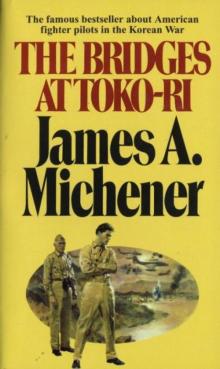 The Bridges at Toko-Ri: A Novel
The Bridges at Toko-Ri: A Novel Poland: A Novel
Poland: A Novel